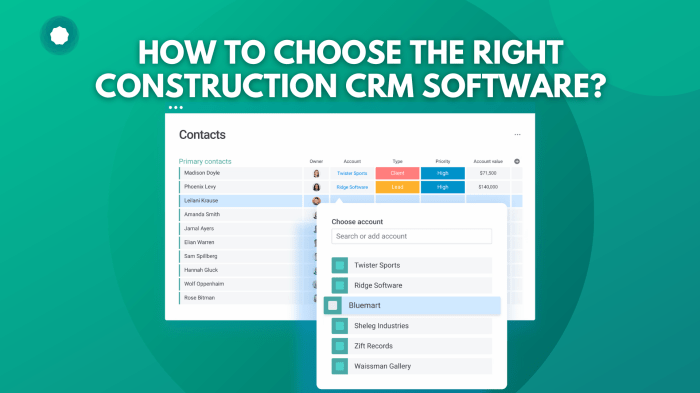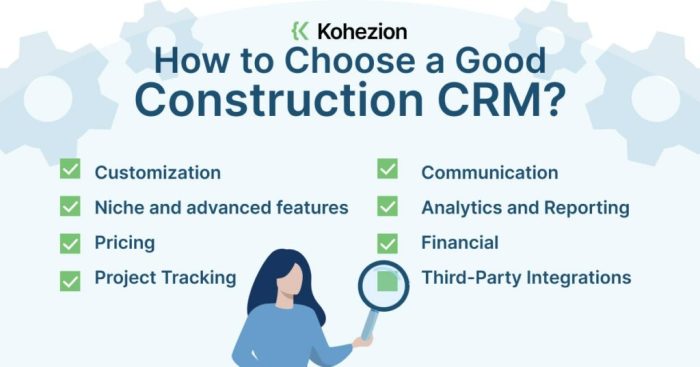Crm software for builders – The construction industry is demanding, requiring meticulous organization, efficient communication, and seamless project management. In this competitive landscape, leveraging the right technology is crucial for success. Customer Relationship Management (CRM) software specifically designed for builders offers a powerful solution to streamline operations, improve client relationships, and ultimately boost profitability. This comprehensive guide delves into the key features, benefits, and considerations when choosing a CRM for your construction business.

Source: cjpath.com
Understanding the Needs of Builders: Why CRM is Essential
Builders face unique challenges that necessitate specialized CRM solutions. Traditional CRM systems often fall short in addressing the complexities of managing multiple projects, subcontractors, materials, and client expectations simultaneously. A dedicated builder’s CRM needs to handle:
- Lead Management: Capturing and nurturing leads from various sources (website, referrals, networking).
- Project Management: Tracking project timelines, budgets, and milestones, assigning tasks, and managing subcontractors.
- Client Communication: Maintaining consistent and transparent communication with clients throughout the project lifecycle.
- Document Management: Securely storing and accessing crucial project documents, contracts, and blueprints.
- Reporting and Analytics: Generating insightful reports to monitor project performance, sales, and overall business health.
- Financial Management: Tracking expenses, invoices, and payments related to each project.
Key Features of a Robust CRM for Builders
A top-tier CRM for construction businesses should go beyond basic contact management. Essential features include:
Project Management Capabilities
- Gantt Charts: Visual representation of project timelines and dependencies.
- Task Management: Assigning and tracking tasks for internal teams and subcontractors.
- Milestone Tracking: Monitoring progress against key project milestones.
- Resource Allocation: Optimizing the allocation of resources (personnel, equipment, materials).
- Budget Tracking: Monitoring project expenses against allocated budgets.
Client Communication Tools, Crm software for builders
- Centralized Communication Hub: All client communication (emails, calls, notes) in one place.
- Automated Email Sequences: Sending targeted emails based on specific project stages or client interactions.
- Document Sharing: Securely sharing project documents and updates with clients.
- Client Portals: Providing clients with access to project information and communication.
Reporting and Analytics
- Customizable Dashboards: Monitoring key performance indicators (KPIs) relevant to the construction business.
- Sales Reporting: Tracking sales leads, conversion rates, and revenue generated.
- Project Performance Reporting: Analyzing project timelines, budgets, and profitability.
- Financial Reporting: Generating reports on expenses, invoices, and payments.
Integration Capabilities
Seamless integration with other essential business tools is crucial. Look for CRM systems that integrate with:
- Accounting Software: Xero, QuickBooks
- Project Management Software: Asana, Trello, Monday.com
- Document Management Systems: Dropbox, Google Drive
Choosing the Right CRM Software for Your Building Business
Selecting the appropriate CRM requires careful consideration of your specific needs and budget. Factors to consider include:

Source: psdcenter.com
- Scalability: The ability to adapt to your growing business needs.
- User-Friendliness: An intuitive interface that is easy for your team to learn and use.
- Customization: The ability to tailor the system to your specific workflows and processes.
- Support and Training: Reliable customer support and training resources.
- Pricing: Different CRM systems offer various pricing models (subscription-based, one-time purchase).
Top CRM Software Options for Builders
Several CRM platforms offer features specifically tailored for construction businesses. Research and compare options based on your requirements and budget. (Note: This is not an exhaustive list, and specific features and pricing may change.)
Frequently Asked Questions (FAQs)
Q: What is the average cost of CRM software for builders?

Source: kohezion.com
A: Costs vary significantly depending on the features, number of users, and chosen provider. Expect to pay anywhere from a few hundred dollars per month to several thousand dollars per month for enterprise-level solutions.
Q: How long does it take to implement a CRM system?
A: Implementation time depends on the complexity of the system and your business processes. It can range from a few weeks to several months.
Q: Can a CRM improve my client relationships?
A: Absolutely! A CRM centralizes communication, ensures timely updates, and facilitates better collaboration, leading to stronger client relationships and increased satisfaction.
Q: What are the key metrics to track in a construction CRM?
A: Key metrics include project completion rates, budget adherence, client satisfaction scores, sales conversion rates, and overall profitability.
Conclusion: Crm Software For Builders
Implementing a CRM system is a strategic investment for any construction business aiming for growth and efficiency. By streamlining operations, improving client communication, and providing valuable insights, a well-chosen CRM can significantly contribute to your bottom line. Take the time to research available options, consider your specific needs, and choose a solution that will empower your team and drive your business forward.
References:
- HubSpot CRM
- Salesforce Construction Cloud
- (Add other relevant links to CRM software providers or industry articles here)
Call to Action
Ready to transform your construction business with a powerful CRM? Contact us today for a free consultation and discover how we can help you choose and implement the perfect solution.
Essential FAQs
What are the key features to look for in CRM software for builders?
Essential features include contact management, lead tracking, project management tools (scheduling, task assignment), reporting and analytics, and ideally, integration with other business software.
How much does CRM software for builders typically cost?
Pricing varies widely depending on the features, number of users, and provider. Expect a range from affordable monthly subscriptions to more substantial enterprise-level solutions.
Can CRM software integrate with existing accounting software?
Many CRM systems offer integrations with popular accounting software, streamlining financial processes and providing a more holistic view of the business. Check for specific integrations before purchasing.
How long does it take to implement CRM software?
Implementation time depends on the complexity of the software and the size of the business. Expect a period of setup, data migration, and training for users, potentially ranging from a few weeks to several months.
What type of training is required for using CRM software?
Most providers offer training resources, including tutorials, documentation, and potentially on-site or online training sessions. The level of training needed will depend on the software’s complexity and user familiarity with technology.
